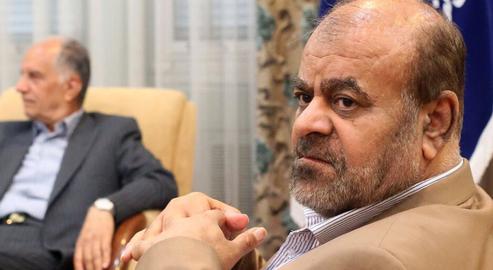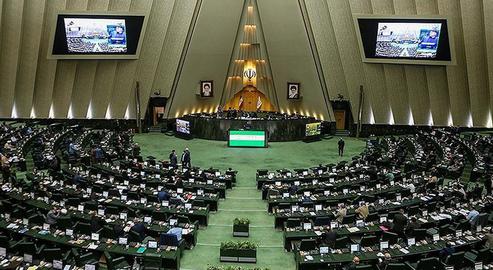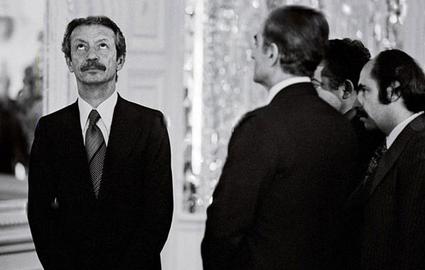President Ebrahim Raisi has submitted his list of proposed cabinet ministers to the Iranian legislature which will begin deliberating on the nominations on August 21. All 19 nominees are expected to be confirmed.
One of these nominees, Revolutionary Guards Brigadier-General Ahmad Vahidi, who is Raisi's pick for the Interior Ministry, is wanted by Interpol. Another, the Guards' Brigadier-General Rostam Ghasemi, and Raisi's nominee for the Ministry of Roads and Urban Development, is on the US sanctions list.
Ahmad Vahidi was the first commander of the Revolutionary Guards expeditionary Quds Force – used by the Islamic Republic for military and paramilitary operations across parts of the Middle East, Africa and Latin America. Vahidi has been charged in connection with the 1994 bombing of the Argentine Israelite Mutual Association (AMIA) building in Buenos Aires, which killed 85 people and injured hundreds, and was Argentina's deadliest terrorist attack.
Argentina’s authorities have previous said that its investigations show the bombing was planned in Iran and carried out by Lebanese Hezbollah. In 2006, Argentina asked Interpol to place several senior Iranian officials, including the late former president Akbar Hashemi Rafsanjani, former foreign minister Ali Akbar Velayati and General Ahmad Vahidi, on the international wanted list.
Hashemi Rafsanjani remained on Interpol’s wanted list until he died and, for close to 30 years, Velayati has never traveled to a country where Interpol might arrest him.
Ahmad Vahidi was former president Mahmoud Ahmadinejad’s defense minister for four years. He did not travel outside Iran in the midst of international tensions over Ahmadinejad’s policies and sanctions against the Islamic Republic. But as interior minister, Ahmadi will be responsible for Iran’s security and, to carry out his duties, he will need to travel to neighboring countries and to attend events such as the annual meeting of the United Nations Office on Drugs and Crime (UNODC) in Vienna.
When Ali Akbar Velayati, who is now Khamenei’s advisor on international affairs, was planning to visit Azerbaijan in 2019, Argentina immediately asked for him to be placed under arrest during his visit. He therefore either canceled the trip or undertook it without the media’s knowledge.
Ahmad Vahidi, if confirmed to the Interior Ministry, will enjoy the immunity that international law grants to government officials. But this is only available to officials undertaking normal government business. Vahidi is accused of helping to plan a bombing that killed many and injured or crippled many others. He may not be protected from arrest and trial; and if the victims of the bombing request his arrest, a host government of any potential foreign visit by Vahidi, depending on its relations with Argentina and other factors, may act on the request.
But even if Vahidi is not arrested while visiting a foreign country, the fact that he is on Interpol’s wanted list is a blow to the new Iranian government’s international credibility. Vahidi is also on the US sanctions list both in connection with his role in the Revolutionary Guards and because of his role in Iran’s nuclear and missile programs.
A Network Run by Father and Son
General Rostam Ghasemi, Raisi’s choice for the Ministry of Roads and Urban Development, has also been sanctioned by the US. Ghasemi is currently the Quds Force’s deputy commander for economic affairs and was Minister of Petroleum under former president Ahmadinejad. In its September 2019 announcement, the US Treasury Department identified Ghasemi as the head of the Iranian-Syrian Economic Relations Development Committee who “manages a group of individuals, shipping and oil companies, and vessels to sell Iranian crude, condensates, and gas oil.”
According to the US Treasury’s press release, Ghasemi relies on trusted Revolutionary Guards and Quds Force officials and associates to run the network, including his son Morteza Ghasemi, who helped to finalize the network’s oil contracts.
A few days ago, the United Stated updated its sanctions list against “individuals and businesses involved in an international oil smuggling network” that support the Revolutionary Guards and the Quds Force. This shows that US President Joe Biden’s administration will continue to target this network even if nuclear sanctions are lifted. In recent months, Rostam Ghasemi and the Quds Force have tried to bypass sanctions on Iranian oil exports; Ghasemi has publicly said so.
One of the most damaging consequences of sanctions against Rostam Ghasemi may become clear if the JCPOA (the nuclear agreement, officially known as Joint Comprehensive Plan of Action) is revived. A key part of this agreement covers the sale of passenger planes with American-made parts to Iran – such as those made by Boeing.
Aircraft makers such as Boeing and Airbus have existing contracts with the Ministry of Roads and Urban Development but, if Rostam Ghasemi is confirmed by Iran’s parliament, these contracts are likely to remain under sanctions, again depriving Iranians of an opportunity to modernize its passenger air fleet.
Add all this to the fact that, besides these two individuals, Iran’s new President Ebrahim Raisi and his First Vice-President Mohammad Mokhber are named on sanctions lists by the United States. Raisi is accused of “crimes against humanity” for his role in the 1988 mass execution of political prisoners in Iran and Amnesty International has called for him to be investigated for this and other crimes.
Raisi’s presidency and his cabinet choices has put Iran in an unprecedented situation that, combined with the government’s inefficiency and systematic corruption, inspires little confidence in the country’s near future.
Related coverage:
Argentina Slams Appointment of Alleged Bombing Mastermind to Iran's Interior Ministry
Sanctioned Setad Boss is Iran's New Vice President
Novices, Ideologues and Terrorists: Raisi’s Cabinet Revealed
Deeply Religious 'Safe Pair of Hands' is Iran's New Economy Chief
Khamenei Confidante, Prisoner Swap Negotiator: Iran's New Ambassador to the UK
Raisi's Crimes Against Humanity Will Haunt his Presidency
Ebrahim Raisi's Victory Signals Darker Days Ahead for Iran
Holy Terror: Iran's Criminal Record from Germany to Ethiopia
Meet the Islamic Republic of Iran's Fixers in Argentina
visit the accountability section
In this section of Iran Wire, you can contact the officials and launch your campaign for various problems



























comments